Women, rights
NGOs welcome Bachelet’s report on the Philippines, call for an
independent investigation on PH rights situation
By
KARAPATAN
June 30, 2020
QUEZON CITY – As UN
High Commissioner for Human Rights Michelle Bachelet delivers her
report to the 44th session of the UN Human Rights Council today,
June 30, at around 4pm (Manila time), Karapatan, Tanggol Bayi and
the Asia Pacific Forum on Women, Law and Development (APWLD),
through a written statement to the UN HRC, called on the Council to
adopt a resolution providing for the independent investigation on
the human rights situation in the Philippines.
“It is increasingly more
imperative for the UN Human Rights Council to take a decisive and
immediate step towards a mechanism to conduct an independent
investigation on the human rights situation in the Philippines, with
the fast-spiralling climate of impunity in the country. With the
heavy-handed restrictions on civil liberties during the COVID-19
lockdown, looming enactment of the Anti-Terrorism Act of 2020, and
the relentless assault on democratic rights in the Philippines,”
said Cristina Palabay, Karapatan Secretary General.
The three organisations
welcomed the report of High Commissioner Bachelet and sought the
attention of the HRC “to the worsening human rights situation in the
Philippines amid the impacts of the COVID-19 pandemic.”
“This situation described
in the report has been aggravated, amid the COVID-19 pandemic. A new
Anti-Terrorism Act of 2020 was recently passed in Congress, after
President Rodrigo Duterte certified the proposed measure as
urgent...The act contains provisions that dangerously infringe on
people’s democratic rights and civil liberties such as the rights of
human rights defenders, freedom of expression, assembly, and
association; right to due process and to privacy; as well as the
right against illegal and arbitrary detention, torture, to cruel and
degrading treatment. Civil society organisations and freedom of
expression advocates view its enactment as one that will seal the de
facto martial law situation in the country,” the three organisations
additionally stated in their written statement.
They cited reports on
gender-based violence during the government-imposed lockdown, on
“overcrowded hospitals, shortage of medical personnel and equipment,
and exorbitant hospital fees driven by privatisation, reproductive
and basic health care services” which, they said, are “becoming less
accessible to women and their families,” they added.
Misun Woo, APWLD Regional
Coordinator, said that workers, including women workers in the
informal sectors, are most affected by the crisis. “Workers in
economic zones in the Philippines are forced to work, without paid
leaves or day-offs, risking workers’ health and disregarding labor
rights,” she stated. Thousands of migrant workers are also displaced
during the crisis, but are given inadequate cash subsidies.
“Thus, we welcome the
report of Ms. Bachelet on the widespread human rights violations in
the Philippines as well as her observations on the failure of
domestic mechanisms to ensure accountability. Her report amplifies
the call for justice and accountability, with the shrinking
democratic and civic space in the Philippines,” they said.
Karapatan is a convening
organisation of the Ecumenical Voice for Human Rights and Peace in
the Philippines, a network of faith-based and human rights groups
engaging in the UN and other international rights mechanisms.
|
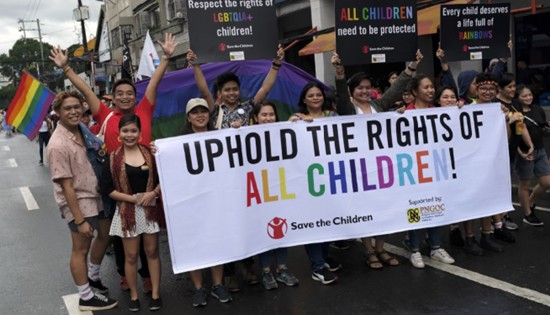
Save
the Children Philippines staff take part in the annual Pride
March held on June 29, 2019 in Marikina City, Philippines. A
record-breaking crowd of around 70,000 braved the rains to
show their support for the LGBT+ community. |
LGBT+ rights are
children’s rights
By
Save the Children
Philippines
June 29, 2020
QUEZON CITY – Save
the Children Philippines unites with the LGBT+ community and calls
on parents, guardians, the general public, and the national and
local government to defend and protect the children, regardless of
their sexual orientation, gender identity and expression.
"There is nothing wrong
with being LGBT+. Just like everyone else, these children have the
right to be loved, protected, and respected" said Mark, a
17-year-old gender equality advocate.
Mark is one of the
adolescents trained by Save the Children Philippines on Adolescent
Health who now teaches fellow youth and children about puberty,
adolescence, reproductive health, and gender equality.
Atty. Alberto Muyot, Chief
Executive Officer of Save the Children Philippines, said LGBT+
children and youth are deprived of their rights because of their
sexual orientation and gender identity such as access to health
services, education, and work opportunities.
“These vulnerabilities are
even exacerbated by the COVID-19 pandemic as they face higher risks
of physical and sexual violence, bullying, ridicule, stigma and
social exclusion,” said Muyot.
The 2016 Philippine
National Baseline Study on Violence against Children (NBS-VAC)
revealed that LGBT+ children are more at risk of suffering physical
violence (75%); psychological violence (78.5%); and sexual violence
(33.8%).
In a consultation with
LGBT+ children in the Association of Southeast Asian Nations (Asean)
countries in 2016, the child participants “admitted suffering from
psychological abuse and discrimination from their own families as
well as schools and communities.”
“Society, especially the
youth, should really be aware of sexual orientation and gender
identity expression (SOGIE) so that we won’t hurt and misjudge
others,” said Mark.
Wilma Banaga, Child
Protection Advisor of Save the Children Philippines said that as
adults, it is our duty to respect, protect and fulfill children’s
rights, including the rights of LGBT+ children. Hence, Save the
Children Philippines actively campaigns for LGBT+ children’s right
to be protected from all forms of violence and discrimination, and
have access to education, health, and well-being.
Children should primarily
feel accepted, supported and protected within their families.
“As adults, we have to
challenge ourselves to get over our discomfort over children not
conforming with the gender norms that we grew up with. Parents and
other family members in particular should be able to love, accept
and support their children no matter what,” Banaga said.
Save the Children
Philippines supports the enactment of the Anti- Discrimination Act
that seeks to institutionalize programs against any form of
discrimination on the basis of SOGIE.
Muyot emphasized that
children and young people have the right to freely express their
views, and adults have the obligation to listen and consider them,
and to facilitate their participation in all matters affecting them.
The child rights
organization also collaborates with the Department of Education (DepEd),
Department of Social Welfare and Development (DSWD), and all other
government agencies to sustain their efforts to promote and protect
the rights of all children by reinforcing gender-responsive
policies.
Save the Children
Philippines is committed to relentlessly work with parents,
caregivers, communities, civil society organizations and
policy-makers to ensure that the rights of all children, especially
the most vulnerable are recognized, protected, respected, and able
to achieve their full potential.
DPWH concretes
Cacaransan to Saputan FMR in Calbayog City, Samar
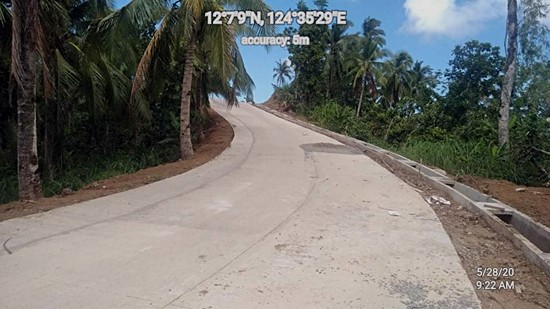
By
CHENZI MAY UY
June 29, 2020
CALBAYOG CITY – The
Department of Public Works and Highways Samar First District
Engineering Office has completed the concreting of the
farm-to-market road (FMR) going to barangays Cacaransan and Saputan,
this city.
The project covers the
construction of 947 meters Portland Cement Concrete Pavement (PCCP)
with slope protection. Also included is an open drainage system
designed to discharge heavy volumes of stormwater run-off. This
prevents flooding or ponding that may eventually weaken the
pavement.
The project has a contract
amount of more than P22 million in convergence with the Department
of Agriculture.
DTI credits DOTr
orders to address high shipping costs
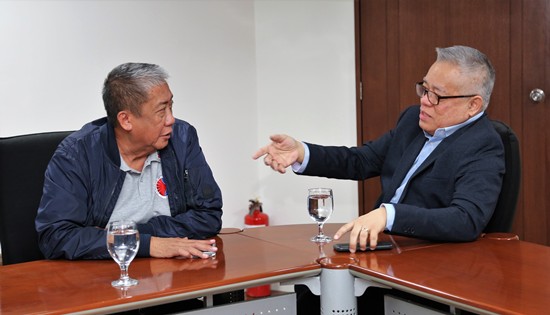
By
DTI-Office of the
Secretary
June 28, 2020
MAKATI CITY –
Department of Trade and Industry (DTI) Secretary Ramon Lopez
credited and supported the initiatives taken by Department of
Transportation (DOTr) Secretary Arthur Tugade to address mounting
complaints against unreasonable shipping charges. This, following
the transportation department’s issuance of multiple Department
Orders to bring down the cost of shipping and provide redress on
complaints against shipping lines.
Sec. Tugade issued an
order creating the Shippers Protection Office (SPO) to assist
shippers that have been assessed unreasonable fees and charges by
shipping lines. Under Department Order 2020-008, the SPO is
authorized to accept complaints pertaining to rates, charges,
practices, and operations of international and domestic shipping
lines.
“The creation of such an
office is very important as importers, exporters, forwarders, and
brokers will now have a venue to ventilate complaints against
shipping lines charging exorbitant and unreasonable fees,” said DTI
Secretary Lopez.
“The intervention of DOTr
in addressing this issue could not have come at a better time,
considering that this has been a recurring problem for shippers,
which affects the general cost of goods and has further aggravated
the economic difficulties that all businesses have been experiencing
due to the pandemic,” Sec. Lopez said.
“At the end of the day,
it’s consumers who will bear the burden of these high costs in terms
of higher prices of final products. Shippers may file their
complaints directly at the SPO,” the trade chief added.
Further, Sec. Lopez cited
Executive Secretary Salvador Medialdea for his leadership in finding
all possible solutions to the high shipping charges. Other agencies
cited were the departments of Finance (DOF), Agriculture (DA), as
well as the Philippine Ports Authority (PPA), Bureau of Customs (BOC),
and the Maritime Industry Authority (MARINA) for helping to address
issues to make logistics in the country more efficient and to reduce
logistics cost, especially during the pandemic.
Sec. Tugade also issued
Department Order 2020-009 prescribing a minimum free time period of
eight (8) days for cargoes unloaded by international shipping lines.
The eight-day period extends the period of five (5) days currently
granted by shipping lines before collecting demurrage charges on
containers. This again is a very welcome intervention in lowering
the overall charges applied to shippers and consignees.
Studies have shown that
the five-day free time period granted by shipping lines to Filipino
importers is one of the shortest free time periods in Asia. The
eight-day free time period aligns the free time period granted by
many shipping lines to importers in other countries.
Moreover, under the
government's policy of ensuring adequate supply of food at
affordable prices, Sec. Tugade also issued Department Order 2020-007
directing all domestic shipping lines to allocate cargo space and
provide preferential rates for agricultural and food products.
The order enjoins all
domestic shipping lines to allocate no less than 12% of a vessel’s
cargo capacity per voyage exclusively for agriculture and food
products and provide a discount of 40% of published rates for
cargoes of said products. The said order is also expected to benefit
farmers by way of boosting demand for locally produced agricultural
products. It will likewise help ensure the unhampered movement of
said products across the country.
“The longer free time of
minimum of eight days prescribed under DO 2020-009 is expected to
minimize, if not eliminate, demurrage charges to be incurred by
consignees on imported products,” Sec. Lopez explained.
He also pointed out that
importers that are able to release their shipments within eight days
no longer have to pay demurrage charges.
For locally-produced
agriculture and food products, the allocation of a vessel’s cargo
capacity and provision of discounted rates as provided under DOTr’s
order can lead to increased competitiveness and demand for such
products. This will contribute to the viability of domestic food
production, as well as help sustain the government's efforts to
attain food security for the country.
“These initiatives are
expected to help stabilize prices of many basic commodities, which
will ultimately redound to the benefit of Filipino consumers.
Secretary Tugade deserves to be commended for taking concrete
actions to resolve the issue of high shipping costs,” added Sec.
Lopez.
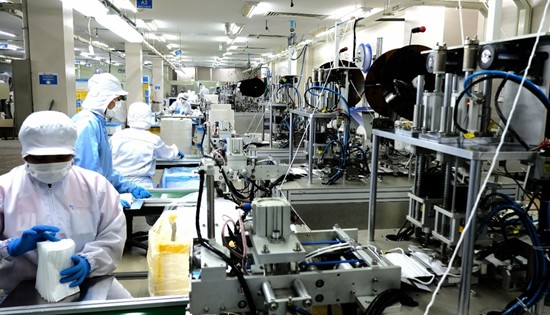
Yokoisada
(Phils.) Corporation manufacturing facilities in Clark. |
Japanese face
mask company Yokoisada to expand in the Philippines
By
DTI-Foreign Trade
Service Corps
June 26, 2020
MAKATI CITY –
Japanese company Yokoisada (Phils.) Corporation recently announced
plans to expand their Philippine operations and double their current
production capacity for face masks. They are also set to begin
manufacturing nonwoven fabric and earloop raw materials for their
masks to lessen reliance on raw materials from China. Their
operations in Clark Freeport Zone will be the main factory for the
Yokoisada group.
Yokoisada President Mr.
Yuki Yokoi shared that their decision to expand was driven by strong
support from the government during the height of the COVID-19
pandemic. As world demand for Yokosaida’s face masks during the
pandemic skyrocketed in March 2020, Yokoisada faced operational
issues including worker availability, raw material logistics, and
personnel movement due to the government’s emergency quarantine
measures. With the help of the Department of Trade and Industry, the
Board of Investments, Clark Development Corporation, and the
Philippine Consulate General in Osaka, Yokoisada managed to quickly
get their production facilities back on track to meet Philippine and
international requirements.
Mr. Yokoi also cited
successful operations in the Philippines for the past years and the
goal to contribute to Philippine society as a reason for expanding.
Yokoisada is currently applying for subsidy under the Japanese
government’s overseas supply chain diversification project.
“We appreciate Yokoisada’s
vote of confidence in the Philippine business environment. The
Philippine government stands ready to assist and facilitate their
investments in our country. This investment will plug a big hole in
our country’s current mask production supply chain, and help ensure
a more reliable supply of masks during pandemics,” Mr. Emmanuel Ang,
Commercial Counsellor in the Philippine Consulate General in Osaka,
said.
Based in Nagoya, Japan,
the parent company is a pioneer in mask manufacturing, having been
in the business for more than 60 years. Yokoisada (Phils.) started
their manufacturing operations in the Clark Freeport Zone in 2013
and was one of only two export-quality surgical face mask
manufacturers in the Philippines prior to the COVID-19 pandemic. The
Philippine factory previously exported most of its production and
imported non-woven fabric raw material from overseas because there
is no local source.
Eastern Visayas
registers 14.3% unemployment rate in April 2020
By
PSA-8
June 26, 2020
TACLOBAN CITY –
Amidst the COVID-19 pandemic scare, about 251 thousand persons in
Eastern Visayas labor force were unemployed in April 2020. This
translates to a double-digit unemployment rate of 14.3 percent, or
10.3 percentage points higher than the 4.0 percent rate recorded in
April 2019. The region ranked fifth among 17 regions with low
unemployment rate in the country.
Meanwhile, employment rate
(ER) in April 2020 was estimated at 85.7 percent, making it the
fifth among regions with high employment rate in the country (Table
1). This figure is 10.3 percentage points lower than the 96.0
percent ER recorded in April 2019. Employment rate is the proportion
of employed persons to the total labor force.
The underemployed or those
employed persons who express the desire to have additional hours of
work in their present job or to have additional job, or to have a
new job with longer working hours was estimated at 328 thousand in
April 2020. This figure translates to an underemployment rate of
21.8 percent, higher than the 18.6 percent recorded in the same
period last year. The region recorded the eighth highest
underemployment rate in the country.
Out of the estimated 3.1
million population 15 years old and over in April 2020, about 1.7
million were economically active or in the labor force. This number
translates to a Labor Force Participation Rate (LFPR) of 56.2
percent. This figure is 5.2 percentage points lower compared with
the 61.4 percent LFPR in the same period a year ago. Eastern Visayas
registered the eighth highest LFPR among regions.
Data were based on the
preliminary estimates released by the Philippine Statistics
Authority from the April 2020 LFS round.
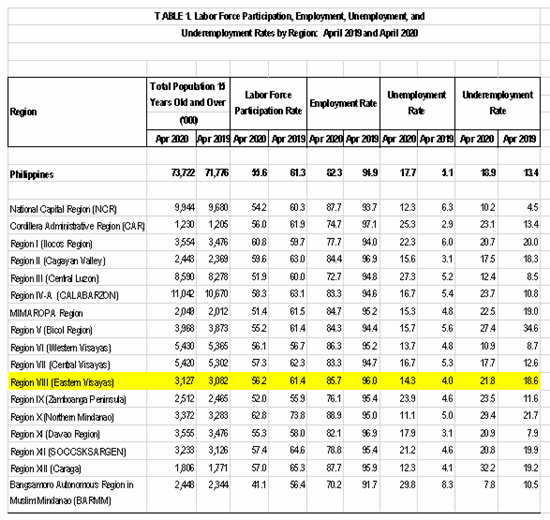
PITC not pursuing
300,000 MT rice importation plan
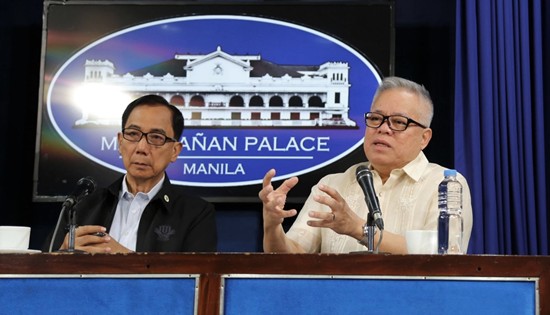
By
DTI-OSEC-Public
Relations Unit
June 26, 2020
MANILA – Following
the official communication from Department of Agriculture (DA)
Secretary William Dar, the Philippine International Trading Center (PITC),
which is an attached agency of the Department of Trade and Industry
(DTI), is no longer proceeding with the planned
government-to-government (G2G) importation of 300,000 metric ton
(MT) of rice that was initially targeted to arrive during the lean
months of July and August.
DTI Secretary Ramon M.
Lopez clarified, "Under the Rice Tariffication Law (RTL), PITC is
the agency tasked to merely implement any directive from DA to
import rice under a G2G arrangement. The provisions of the RTL
basically opens up rice importation to any private group."
He added: "It will be
recalled that the initial decision for the G2G importation plan was
a result of the potential threat to maintaining a good buffer supply
of rice for the country. Earlier computations from DA showed a
threat to the targeted level of buffer stock following the imposed
ban of rice exportation of Vietnam in April."
Historically, Vietnam
serves as a major import source of the Philippines, accounting for
over 90% of our country’s rice imports. The Philippines imports
around 7-14% of total rice requirement.
Upon intervention of
President Duterte, the Vietnamese government, through Prime Minister
Nguyen Xuan Phuc, agreed to lift its rice export ban policy making a
commitment to the Philippine President that Vietnam will contribute
to securing a stable supply of food in the country.
"With the lifting of the
rice export ban of Vietnam, we can expect more comfortable buffer
stock levels moving forward," the trade chief said.
Agriculture Secretary Dar
noted: “Also, with the rice imports handled by the private sector
traders as stipulated by the RTL, their purchase of rice imports
will mean generating greater tariff revenues for the government
which, under the RTL, will be used to fund the Rice Competitiveness
Enhancement Fund (RCEF). RCEF is meant to boost productivity and
income of the country’s rice farmers.”
The Chemicals In
Burned Toast And Crispy Fries Won't Kill You, But The Calories Might
A new campaign to promote
awareness about not burning food like toast and potatoes were
launched. Doing so generates a chemical called acrylamide, which the
International Agency for Research on Cancer categorised as "probably
carcinogenic to humans. There's just one problem: there's no
compelling proof that acrylamide causes cancer in humans. Cancer
Research UK notes that acrylamide could produce mutations linked to
cancer when they interact with DNA but human studies have yet to
find such a connection.
There's no evidence that
acrylamide consumption increases the risk of getting any cancer says
the American Cancer Society but the Chief Cancer Control Officer at
the American Cancer Society Richard Wender, note that fried potatoes
and other crispy carbs have one link to cancer. They are the second
leading cause of preventable cancer in the US, just behind tobacco
and are full of unnecessary calories and obesity.
Many articles on cancer
hazards cite the IARC's list of possible cancer causes. Despite the
fact that court cases reveal IARC designations as confirmation on
whether something is or is not carcinogenic.
The Group 2A list is just
one level below Group 1 where acrylamide resides, which lists known
cancer causes and includes things such as human papillomavirus (HPV),
insecticides, malaria, and working as a petroleum refiner. When you
understand that Group 2A also includes being a shiftwork
hairdresser, that involves disrupting your circadian rhythm, and
very hot beverages, it sounds scary.
It doesn't mean that
everything on the list all causes cancer in humans because of some
evidence that might increase a person's risk for cancer. The IARC's
greatest misunderstanding is this: the IARC classifies possible
carcinogens by how likely it is that they cause cancer but doesn't
classify known carcinogens by how much cancer they cause.
Animal studies reveal the
acrylamide's place on the IARC list shows very high doses of
acrylamide to raise the risk of certain kinds of cancer in non-human
animals. Those studies recommend that acrylamide can cause cancer
through some strange mechanism, cause changes in DNA that result in
cancer but researchers have yet to discover what that mechanism
might be.
To test carcinogenic; rats
and mice were given acrylamide; they're given higher doses of 1,000
to 10,000 times greater than what humans are commonly exposed to in
food. This method allows researchers to see even the tiniest effects
and is the common way of testing carcinogenicity. A Professor and
statistician of the Public Understanding of Risk at University of
Cambridge, David Spiegelhalter and Dr Alastair Brown from
DearJane
Medical says Adults with the enormous consumption of acrylamide
could consume 160 times more and still only be at a stage that
toxicologists think unlikely to cause elevated tumors in mice."
Human studies haven't
found any increased risk to cite, so none of the articles discussing
burnt toast and potatoes cited statistics. The numbers are likely to
be minuscule even if they had, which means the risk had to be
reported in a measured way.
For example, Brian Zikmund-Fisher
illustrates a problem that the FDA put out a warning that people
shouldn't eat cookie dough because some flour is infected with E.
coli, but the chances that you are getting such an infection are
tiny. It would be easy to say that the FDA shouldn't be frightening
people about such a small risk.
Zikmund-Fisher opposes and
says the FDA is not wrong for saying that consuming raw flour has an
incremental risk, but if we're not discussing recalled flour, the
absolute risk is minimal. People will need to estimate how much they
value burnt potatoes and toast if acrylamide does increase our risk
of having cancer by some tiny amount.
Scientists, government
agencies, and journalists have to communicate the risks precisely
for folks to make an informed choice. A Director of the Behavioral
Decision Making Initiative at The Ohio State University, Ellen
Peters says people overestimate that they will to benefit from a
medication if you don't give them the numeric chances of benefit.
Providing the number or not is the biggest difference she says.
There were no numbers to give in the case of burnt potatoes, but the
fact that a risk is involved makes a difference. Peters says this is
not a neutral way to present information.
You're likely to ignore
hundreds of articles for years on various things that may or may not
increase your cancer risk. Zikmund-Fisher says we can only bother so
much at any given point in time, and when we bombard people with
messages, they turn it all off. All this bombardment makes people
focus on the wrong things. This means that cumulative experience is
not optimal.
You can dramatically
reduce your risk of getting or dying from cancer by Avoiding all
tobacco, trying to achieve a healthy weight as possible, exercising,
protecting yourself from the sun. Getting cancer-preventing vaccines
like HPV vaccines a Hepatitis B, being screened for Hepatitis C, and
getting all recommended cancer screens. Follow these steps and
cancer risk would be cut in half if you eat the occasional fried
potato and burnt toast.
|
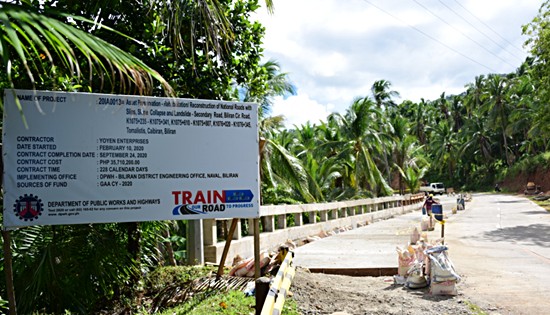
The
asset preservation – rehabilitation/reconstruction of
national roads with slips, slope collapse and landslide –
secondary road along Biliran Circumferential Road,
Tomalistis, Caibiran, Biliran is on-going with 32.46%
accomplishment as of May 31, 2020. The completion of this
project will provide a structure that will prevent further
road slips and landslides on the said area. |
DPWH-Biliran DEO
posts 47.64% accomplishment of CY 2020 projects
By
DPWH-Biliran
June 26, 2020
NAVAL, Biliran –
The Department of Public Works and Highways (DPWH) Biliran District
Engineering Office achieved 47.64% accomplishment of its CY 2020
implementation as of May 31, 2020.
David P. Adongay Jr.,
District Engineer (DE) reported that out of the 35 projects under CY
2020 General Appropriations Act (GAA) comprehensive release, Biliran
DEO has completed eight while 28 are on-going.
DPWH-Biliran DEO has been
allotted P1.08B under 2020 GAA for the implementation of 75
infrastructure projects. However, DE Adongay said that 40 of these
were categorized as “For Later Release” (FLR) by the department,
which means that the release of fund for the said projects are
withheld.
“Because of COVID-19
situation, these FLR projects will not be released in full,”
revealed DE Adongay.
The DE said that the
office is already programming those FLR projects which can be
completed this year and only the funds for that projects will be
released.
“FLR projects which will
not be funded this year will be included and prioritized in our CY
2021 listing,” DE Adongay said.
As of May 31, 2020, the
district office has completed the P20M rehabilitation of Mapula
Flood Control; P5M construction of multipurpose building, Brgy.Villa
Vicenta; P2M construction of barangay road, Brgy. Victory; P1.17M
construction of road, Ibanez St., Brgy. Palanay; P2.6M construction
of road, Santiago St., Brgy. Palenque and Palana; and P1.2M
construction of road, Mocorro St., Brgy. Palenque, all in the town
of Caibiran.
Biliran DEO has also
completed the P10M construction of Cabadiangan Flood Control in
Naval town and P3M construction of seawall, Brgy. Baso, in the town
of Cabucgayan.
According to DE Adongay,
construction of infrastructure projects in Biliran is continuous
following DPWH construction safety guidelines amidst COVID-19 health
crisis.
DPWH-Biliran DEO targets
to finish all CY 2020 projects within the year as mandated under the
new cash-based budgeting system of the department.
DILG suspends
return of LSIs to region 8 from June 26 - July 9
Press Release
June 26, 2020
TACLOBAN CITY – The
Department of the Interior and Local Government (DILG) has stopped
the travel of Locally Stranded Individuals (LSIs) starting today,
June 26 until July 9, 2020 based on a joint resolution submitted by
the Regional Inter Agency Task Force for the Management of Emerging
Infectious Diseases (RIATF-MEID) and the Regional Task Force for
Coronavirus Disease 2019 (RTF COVID 19) to give time for local
government units to vacate and disinfect quarantine facilities for
returning residents.
According to DILG-8
Regional Director Karl Caesar R. Rimando, this came about after DILG
Secretary Eduardo M. Año and Task Force COVID-19 Chief Implementer
Carlito G. Galvez Jr. attended the Joint Meeting last June 24, 2020
in Palo, Leyte to investigate the sudden spike of the number of
confirmed positive patients.
During the meeting,
Provincial Governors and the invited mayors voiced their appeal for
a moratorium, citing that their facilities have been “overwhelmed”
with quarantined returning residents.
The DILG Secretary was
supportive of the sentiments of the top officials in Eastern Visayas,
and congratulated the regional and local officials for properly
managing COVID cases. They likewise turned over 4,000 PPEs and 8,000
N95 masks for distribution to health workers and front liners in the
region.